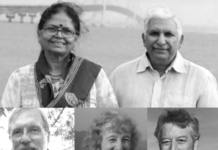Prabhat Rainjan Sarkar presented in 1982, in India, the philosophy of Neo-humanism. The book “The Liberation of Intellect: Neo-Humanism” was based on his discourses on the magnificent ideology of the path of bliss.
The book is a human treasure, addresses a brilliant philosophy for humanity in the goal of union with the Infinite.
At the beginning of the book, P.R.Sarkar explains that human beings must live by using a subjective approach, that there are different streams of movement on the outer and inner world of each individual. In the past, there were several philosophies that seemed good, but which later proved impractical on the physical, mental or spiritual levels, leading society and human beings to many imbalances, that is, they created many dogmas, fanaticisms and so on.
In one passage, P.R.Sarkar says “Vaecitryam ‘Prakrstadharma Sama’nam’ Nabavis Yaty”,
which means diversity is a law of nature: uniformity will never occur, so dynamism is the first and last word of human existence.
For example, a stagnant lake breeds a lot of mosquitoes, a lot of weeds, people can’t enjoy that still water. So what must be done is to fill the lake with land and eliminate its existence. Similarly, when human society reaches a very low existential level, it is necessary to make a major change and develop a rationalist mindset so that human beings move from this very basic, stagnant plane to a glorious existence.
To this end, P.R.Sarkar says that we must elevate the feelings that keep us very narrow, that make us remain with a very selfish mind, thinking only of ourselves. And this elevation leads us to devotion.
Devotional feeling is the most beautiful, most valuable, most precious of the human heart. It is the brightest jewel of mankind and must be preserved very carefully.
So too, we must be careful to establish a proper philosophy for harmony among human beings, animals, plant species, and the inanimate world. Neo-humanism will always be a perennial source of inspiration for society to achieve its goal.
P.R.Sarkar makes it clear that we need to evolve from feelings that limit human society, such as geo-centrism, sociocentrism, geo-patriotism, geo-religion, geo-economics, and humanist sentiment itself, etc, to the more advanced sentiment that is neo-humanism, the philosophy that leads to universalism, the love for all beings in this universe.
P.R.Sarkar also says that we must develop the proto-spiritualist mentality through the principle of social equality, which in Sanskrit is called “sama samaja tattva”, the principle of social equality, which teaches that the basis of righteousness, or dharma, is the collective march of all beings in unison, and also the firm foundation of humanity.
Humanism, which is a feeling not motivated by a perennial source of inspiration, will become only a formality. Groups such as family, caste, religion, race, must also be broader, limitless, embrace all.
When imbued with rationality and sama samaja tattva, we can move to subjectivity, to devotion. The devotional path is internal: “when I feel that only me and my Lord exists.”
It is very important to maintain rationality, studies, they facilitate the path to the Supreme Being.
The book also deals with the human complexes, psychic exploitation, political and economic exploitation, cultural exploitation, religious exploitation to which human beings are subjected. P.R.Sarkar also speaks of revolutionaries and reformists. All of these subjects are described in detail.
Another subject of the book is pseudo-humanism, which is technically called very narrow, minimalist social sentiment, in contrast to humanistic sentiments, considered maximist, or social sentiments of excellence. In all, P.R.Sarkar speaks of three feelings that can evolve into neo-humanism: geo-feeling, social feeling, and human feeling.
An example of how narrow human sentiment is: one person works for one country and says he has decided he will work for all other countries, he is an internationalist but not a neo-humanist because he is not concerned with the harmony of the inanimate world, for example.
The book also addresses the awakening of human consciousness. P.R.Sarkar speaks of the importance of the study of consciousness, and speaks of neo-humanism as an ideology for the new generations, with the development of a proto-psychic spirituality. He says that neo-humanism will be a permanent shelter for the human being.
In the last part of the book, P.R.Sarkar describes spirituality as a physical-psycho-spiritual process that will show humanity how to remove prejudice and move quickly toward the spiritual world without delay or lateness. He says that our ectoplasmic cells will evolve to reach the goal of Supreme Consciousness.
P.R.Sarkar defines spirituality as essence and says that humanity has a collective mind. He says that to really change the collective mindset, we must create a new wave of thought. With this, the progress of humanity will be rapid and we will enjoy the collective mental and ectoplasmic development. With the expanded mind there will be no more pseudo-humanistic processes, and the collective spiritual force will be very strong, emanating from a Supreme existential core, connected with each individual. Human beings will achieve unity with the Existence Controller Core, and this is the highest expression of neo-humanism.
P.R.Sarkar concludes that neo-humanist status will save not only human beings, but all beings, including the inanimate world, and that universal humanity will consummate its existence. Nothing will be impossible for humans. He also comments that humanity is desperate, that people are very focused on their imperfections and what they can and cannot do, but that in the neo-humanist Supreme State this thinking will change. People will say, “I am a neo-humanist, so I am destined to do a great job. I came to this planet for this. And even if someone says, “Darkness is good for me,” others will say, “Once you come to the light, you will no longer want to return. Come to the light, because the light is so much better.”
And no one will be left behind.
By Avadhutika Ananda Usa Acarya
Translated by Krshnakali (Camila Mozzini-Alister)
Didi Ananda Usa is a meditation instructor, yogini monk since 1979, lecturing on the spiritual and social philosophy of Prabhat Rainjan Sarkar in various countries. Brazilian by birth, she is currently the Coordinator of 3 social services projects in a poverty zone in Asheville, North Carolina, USA. She has been working on vegetable, fruit and herbal gardens projects for 11 years at the Viithika Master Unit in Marshall, in the same state.







